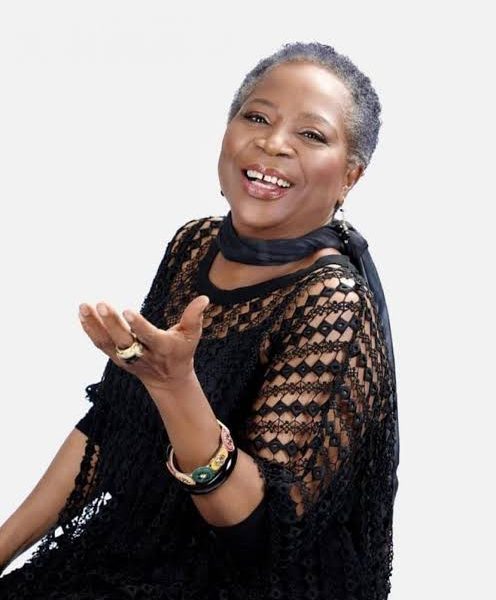Culture and Entertainment
Onyeka Onwenu’s Enduring Legacy of Pan-Nigerian Reconciliation.

Onyeka Onwenu’s memorial will always stand as a powerful symbol of Pan-Nigerian reconciliation, reflecting a profound commitment to unity and harmony across the diverse Nigerian cultural landscape. Her journey was deeply rooted in Igbo cultural heritage and enriched by education in the United States.
She was trained in notable scenic and beautiful lake woodlands community with a botanical garden, Wellesley College, Wellesley, Massachusetts, USA. That is about 12 miles west of Boston. She was also at The New School for Social Research situated in vibrant Greenwich Village neighborhood of New York City, USA. Those positioned her uniquely as both an advocate for social justice and a cultural ambassador.
Onwenu earned a BA in International Relations and Communication and an MA in Media Studies from both US institutions, returned and joined the Nigerian Television Authority (NTA), 1980. In 1984, Onwenu co-produced the BBC documentary ‘Nigeria: A Squandering of Riches,’ https://youtu.be/y-OzTxlstw8 critically examining resource mismanagement and corruption, solidifying her role as a social commentator and advocate for accountability, despite attracting controversy.
Internationally, it enhanced her recognition as an artist and activist committed to social justice, solidifying her reputation as a multifaceted figure advocating for positive change. The same streak of character influenced Onwenu’s music career, which also flourished, with songs often addressing social issues and promoting unity and peace
Born January 31, 1952, in Obosi, South-East Nigeria, she was a popular singer, journalist and advocate for women’s rights. The Nigerian Civil War (1967-1970) had profound impacts on Onwenu’s early life. More so, following her father, D.K. Onwenu, a prominent educationist and politician’s passing in a car accident, leaving the mother to raise five children alone.
Onyeka Onwenu’s Igbo heritage significantly shaped her post-Civil War career, earning recognitions from cultural organizations. She chaired the Imo State Council for Arts and Culture, led the National Centre for Women Development and engaged in politics through the People’s Democratic Party (PDP) to address social issues.
In the 1990s, Onyeka Onwenu shifted her music to Christian gospel, continuing her advocacy for women’s rights, health issues, and social justice. As Chairperson of the Imo State Council for Arts and Culture and Executive Director of the National Centre for Women Development, she envisioned a reconciled Nigeria founded on inclusivity and understanding among diverse ethnic groups. Her arts still promote dialogue, unity, and reconciliation in Nigeria, empowering marginalized communities, especially women, through education, activism, and media for social reforms.
Onwenu’s compassionate outreach extended to health awareness, particularly HIV/AIDS advocacy, where she integrated health campaigns with music, fostering a sense of community responsibility. Moreover, her role in “Half of a Yellow Sun” showcased Nigerian narratives to global audiences, promoting cultural pride and cross-cultural dialogue. In glory, Onwenu now unites art and advocacy for Pan-Nigerian reconciliation and change.
She was trained in notable scenic and beautiful lake woodlands community with a botanical garden, Wellesley College, Wellesley, Massachusetts, USA. That is about 12 miles west of Boston. She was also at The New School for Social Research situated in vibrant Greenwich Village neighborhood of New York City, USA. Those positioned her uniquely as both an advocate for social justice and a cultural ambassador.
Onwenu earned a BA in International Relations and Communication and an MA in Media Studies from both US institutions, returned and joined the Nigerian Television Authority (NTA), 1980. In 1984, Onwenu co-produced the BBC documentary ‘Nigeria: A Squandering of Riches,’ https://youtu.be/y-OzTxlstw8 critically examining resource mismanagement and corruption, solidifying her role as a social commentator and advocate for accountability, despite attracting controversy.
Internationally, it enhanced her recognition as an artist and activist committed to social justice, solidifying her reputation as a multifaceted figure advocating for positive change. The same streak of character influenced Onwenu’s music career, which also flourished, with songs often addressing social issues and promoting unity and peace
Born January 31, 1952, in Obosi, South-East Nigeria, she was a popular singer, journalist and advocate for women’s rights. The Nigerian Civil War (1967-1970) had profound impacts on Onwenu’s early life. More so, following her father, D.K. Onwenu, a prominent educationist and politician’s passing in a car accident, leaving the mother to raise five children alone.
Onyeka Onwenu’s Igbo heritage significantly shaped her post-Civil War career, earning recognitions from cultural organizations. She chaired the Imo State Council for Arts and Culture, led the National Centre for Women Development and engaged in politics through the People’s Democratic Party (PDP) to address social issues.
In the 1990s, Onyeka Onwenu shifted her music to Christian gospel, continuing her advocacy for women’s rights, health issues, and social justice. As Chairperson of the Imo State Council for Arts and Culture and Executive Director of the National Centre for Women Development, she envisioned a reconciled Nigeria founded on inclusivity and understanding among diverse ethnic groups. Her arts still promote dialogue, unity, and reconciliation in Nigeria, empowering marginalized communities, especially women, through education, activism, and media for social reforms.
Onwenu’s compassionate outreach extended to health awareness, particularly HIV/AIDS advocacy, where she integrated health campaigns with music, fostering a sense of community responsibility. Moreover, her role in “Half of a Yellow Sun” showcased Nigerian narratives to global audiences, promoting cultural pride and cross-cultural dialogue. In glory, Onwenu now unites art and advocacy for Pan-Nigerian reconciliation and change.